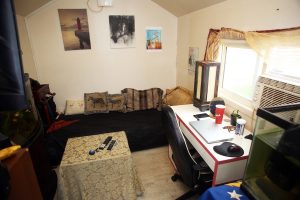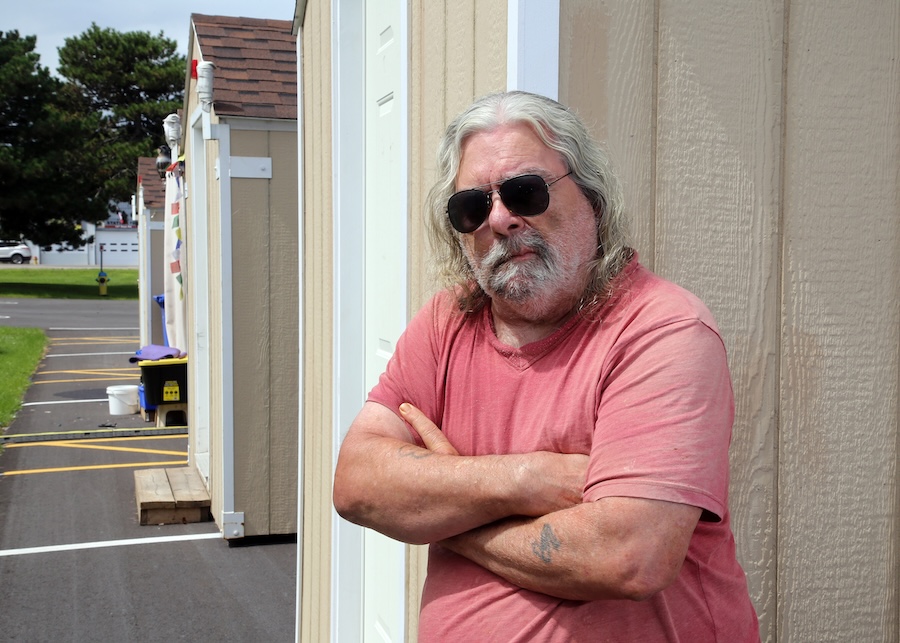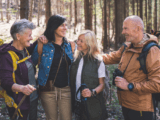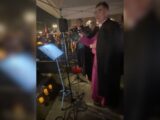“I’m old. I’m cranky. I’ve been here for two and a half years now.”
This is how Ron Durston introduces himself. The 69-year-old lives in one of the 17 sleeping cabins that were built to address the homelessness crisis in Kingston, Ont., and he’s cranky because his housing worker is running late. That wouldn’t be a problem in and of itself, except that the worker is bringing Durston his favourite dark roast coffee, and, like many people, he’s out of sorts before his first cup of the day.
You may unsubscribe from any of our newsletters at any time.
It’s a sort of ritual for housing workers to bring drinks for the residents, and several of whom are milling around, waiting for the trays from Tim Hortons and McDonald’s to arrive. There’s a restless feeling in the air, and not just because the coffee has yet to arrive. Many of the residents are feeling anxious because the future of the sleeping cabins is currently uncertain.
The sleeping cabin program is the result of a partnership between Our Livable Solutions (OLS), a local non-profit organization dedicated to ending homelessness, and the City of Kingston. Because the cabins have heat and electricity but no plumbing, residents require access to buildings with washrooms, showers, kitchens and laundry, and up until now, Kingston has allowed them to use city land and facilities. In the spring and summer, the cabins have been at Centre 70 Arena during its off-season, then moved to Portsmouth Olympic Harbour marina for the fall and winter. But in November 2023, Kingston city council voted to end the program by this fall. Residents have been served eviction notices for Sept. 30.
More on Broadview:
The current plan — which city council approved in early July — is to transfer the cabins to a stretch of unused land on the property of Crossroads United, about seven kilometres away from their present location at the arena. The church has pledged to build a mobile unit for the facilities the residents need, and day-to-day operations will continue to be overseen by OLS. Although plans are in motion for the move to happen, legal and logistical delays have meant that the city’s deadline might not be met. No one is sure what will happen if the cabins remain on city property once September is over. The city has said that none of the residents will be put out on the street, but have yet to clarify whether that means permanent housing will be found, shelter beds will be made available, or whether there will be some other solution.

Before moving into one of the sleeping cabins, Durston was living in his van. When Chrystal Wilson, the founder of OLS, first spoke to him about the cabins, Durston wasn’t sure that the program was something he wanted to participate in, believing that he would have to share a living space with someone else. But each resident gets their own cabin, which Durston refers to as a “fortress of solitude.” He likes that he can lock his door and shut the world out whenever he wants, but he also says that he’s come to see the other residents as family.
Centre 70, which is in Kingston’s west end and sits between a residential neighbourhood, an industrial park and farmland belonging to a correctional facility, is not within walking distance to most amenities. Portsmouth Olympic Harbour is about three kilometres down the road and more centrally located, but still lacks easy access to many of the things residents need. Durston, whose van finally broke down for good earlier this year, finds the current location challenging, since he doesn’t like depending on other people for rides. One of the reasons he looks forward to the move to Crossroads is that there will be grocery stores, pharmacies, and a transit hub all within a five-minute walk.
Fellow resident Jimmy Armstrong, 47, is less concerned about where the cabins are located — he bikes everywhere and enjoys the ride from the arena into the city centre. His biggest source of anxiety at the moment is the fact that he’ll soon be leaving for rehab, a move that OLS has facilitated, and he’s not sure what will happen if he completes his treatment but the cabins still haven’t relocated to Crossroads.
“It’s been a long process,” says Armstrong. “It took a long time to admit that I’m an addict. And then it took probably about a good two months before I could say I was an addict all in one sentence and not cry. I can do it now.”
But he worries that if the cabins don’t move before the deadline, he might wind up back on the streets. And if that happens, the possibility of relapse increases exponentially. It’s hard for any addict to stay sober, but even harder when you have to deal with the compounding stresses of homelessness. Many unhoused people use substances to help numb their feelings, a way of taking a break from the grinding reality of life on the streets; they also sometimes use them to help stay awake. Falling asleep means running the risk of having your possessions stolen.
“I knew a guy who slept on the trails and kept his stuff in a bookbag,” says Armstrong. “He slept with it on him, but people came and cut the straps. They’ll even cut your pockets out.”
All the residents appreciate the sleeping cabins for a number of reasons: the community, access to services like dental care and substance abuse treatment through OLS, and, of course, having a warm, dry place to sleep at night. But two themes recurred over and over during interviews. One was that the cabins give residents a safe place to leave their belongings and know that they’ll be there when they come back, and the other was the ability to go somewhere private and know that others can’t intrude. The uncertainty over what will happen after Sept. 30 has left many residents feeling like the rug has been pulled out from under them.
For Durston, the experience just adds to his cynicism about how the city has dealt with homelessness.
“I… trust my ability in surviving [more] than… the people that say [they] will help you survive.”
***
Anne Thériault is a journalist in Kingston, Ont.














